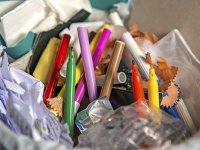My First PBL Unit: Learning From My Students
In her first PBL unit, a new teacher learns how giving her students voice and choice will ignite their passions and enhance their learning.
Your content has been saved!
Go to My Saved Content.As an "Instructional Innovator" in my district, I was asked to implement project-based learning in my classroom. As a new teacher, currently in my second year of teaching fifth grade, I was nervous and excited at this prospect.
The Project
Thinking about the purpose of PBL, which is to have students gain deep knowledge through exploration of real-world problems, I developed a project for my class that focused on a problem I had observed the previous year: waste in my classroom. Our trashcan and recycling bin overflowed daily, with no distinction between the two. Students routinely threw away half-used pieces of paper, perfectly good pencils, and food they didn’t want. This was a problem that affected my students -- and me -- and I hoped it was also a problem that would interest them as much as it interested me.
So with this idea in mind, I developed a PBL unit that explored waste, the effect of waste on our community and planet, and the different ways that we, as a class, could reduce waste in our classroom. After an introduction event during which students classified the waste from our room, we read articles, watched videos, and participated in a Skype Education lesson to learn about waste.
I next posed our inquiry question to my class: "How can we reduce waste in our classroom?" From this inquiry, groups of students refined their focus by discussing specific problems relating to the question. The problems they chose included students throwing away uneaten food, using plastic water bottles instead of reusable bottles, and discarding paper instead of erasing mistakes. My goal was to have my students think more critically about the causes of waste in our classroom, and to target the causes in their projects. The student groups then took their focus problems and conducted research to develop a plan for waste reduction. Through collaboration with the San Francisco Film Society, they were able to create films to educate our school and community about the plans they had developed.
The Process
I can truthfully say that much of my first PBL unit went as planned. This, however, was due to the restrictions I placed on students' "voice and choice." My students were allowed to choose the type of waste their project would focus on, and whether they would make a narrative or documentary film for their final project. I imposed these restrictions because I envisioned losing control of a large class project, and I didn't have the resources, time, or patience to support individual projects that were allowed to grow and become something beyond the scope that I had planned. I chose to focus on collaboration as the skill that I would help them develop and build their proficiency, and I have definitely seen some students struggling with group management. Even with a very independent and responsible group of students, decision making, job sharing, and planning can challenge them.
Throughout the project, from planning through the completion of our films, I've relied strongly on my colleagues to reflect and bounce ideas. I created a graphic organizer to guide student research, and realized part of the way through the project that the organizer did not focus enough on my students' individual projects, but on waste in general. It was through a discussion with a colleague that I decided to scrap the graphic organizer and let student groups guide their own research, both in books and on the internet. I needed to let go a little and trust that they would be productive without that support.
The Outcome
Was my first PBL experience perfect? Of course not. Would I try again? Absolutely.
Even though my fear of losing control limited the project, my students still stayed engaged and were able to work on the big skill that I hoped they would learn to practice: collaboration. For my next PBL unit, I will likely have my students guide our focus a bit more and find a problem (or have them find a problem) that matters to them. I will need to trust myself a bit more by trusting my students with more "voice and choice" in the direction their project takes.
When I've talked and reflected with my students, I can see that each has been able to find something he or she liked about the project. Some students loved doing research on our Chromebooks. Others enjoyed physically digging through our trash. One student focused her energy on writing a song to include in her group's film. The best part about my first attempt at PBL was seeing my students excel in the areas they most enjoy, and giving them a chance to share these talents with their peers. My personal challenge will be to help them harness these skills in our next project, to dig deeper, and find meaningful ways to understand our content.
What did you learn from your first experience with PBL? Please share your reflections below in the comments.
